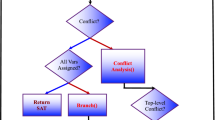Abstract
We define a class of function-free rule-based production system (PS) programs that exhibit non-deterministic and/or causal behavior. We develop a fixpoint semantics and an equivalent declarative semantics for these programs. The criterion to recognize the class of non-deterministic causal (NDC) PS programs is based upon extending and relaxing the concept of stratification, to partition the rules of the program. Unlike strict stratification, this relaxed stratification criterion allows a more flexible partitioning of the rules and admits programs whose execution is non-deterministic or causal or both. The fixpoint semantics is based upon a monotonic fixpoint operator which guarantees that the execution of the program will terminate. Each fixpoint corresponds to a minimal database of answers for the NDC PS program. Since the execution of the program is non-deterministic, several fixpoints may be obtained. To obtain a declarative meaning for the PS program, we associate a normal logic program\(\overline {PS} \) with each NDC PS program. We use the generalized disjunctive well-founded semantics to provide a meaning to the normal logic program\(\overline {PS} \) Through these semantics, a well-founded state is associated with\(\overline {PS} \) and a set of possible extensions, each of which are minimal models for the well-founded state, are obtained. We show that the fixpoint semantics for the NDC PS programs is sound and complete with respect to the declarative semantics for the corresponding normal logic program\(\overline {PS} \).
Similar content being viewed by others
References
Abiteboul, S., Simon, E., and Vianu, V., Non-deterministic languages to express deterministic transformations, inProc. ACM Symposium on Principles of Database Systems, 1990, pp. 218–229.
Abiteboul, S. and Vianu, V., Procedural languages for database queries and updates,J. Computer and System Sciences 41(2) (1990), pp. 181–229.
Abiteboul, S. and Vianu, V., Datalog extensions for database queries and updates.Journal of Computer and System Science 43 (1) August 1991 p.p. 62–124.
Apt, K. R., Blair, H. A., and Walker, A., Towards a theory of declarative knowledge, in J. Minker (ed.),Foundations of Deductive Databases and Logic Programming, Morgan Kaufman Publishers, Inc., 1988.
Baral, C., Lobo, J., and Minker, J., Generalized disjunctive well-founded semantics for logic programs: declarative semantics, inProc. of the 5th Intl. Symposium on Methodologies for Intelligent Systems, 1990.
Ceri, S. and Widom, J., Deriving production rules for constraint maintenance, inProceedings of the Conference on Very Large Data Bases, Brisbane, Australia, 1990.
Davis, R. and King, J., An overview of production systems. AI Memo No. 271, Stanford AI Lab, 1975.
Demolombe, R., Syntactical characterization of a subset of domain independent formulae, Technical Report, ONERA-CERT, Toulouse, 1982.
Delcambre, L. M. L. and Etheredge, J. N., A self-controlling interpreter for the relational production language, inProceedings of the ACM Sigmod International Conference on the Management of Data, 1988.
Fagin, R., Kuper, G., Ullman, J. D., and Vardi, M. Y., Updating logical databases, in P. Kanellakis (ed.),Advances in Computing Research, Vol. 3, JAI Press, 1986, pp. 1–18.
Forgy, C. L., OPS5 User's Manual. Technical Report CMU-CS-81-135, Carnegie-Mellon University, 1981.
Forgy, C. L., Rete: A fast algorithm for the many pattern/many object pattern match problem,Artificial Intelligence 19, (1982).
Gelfond, M. and Lifschitz, V., The stable model semantics for logic programming. In R. Kowalski and K. Bowen (eds.),Proceedings of the 5th International Conference and Symposium on Logic Programming, August 15–19, Seattle, WA, 1988, pp. 1070–1080.
Kowalski, R. and Sadai F., Knowledge representation without integrity constraints, Technical Report, Department of Computing, Imperial College of Science and Technology, 1989.
Kiernan, G., de Maindreville, C., and Simon, E., Making deductive databases a practical technology: A step forward, INRIA Research Report 1153, 1990.
Kowalski, R. and Sadri, F., Logic programs with exceptions.Proceedings of the International Conference on Logic Programming, 1990.
Lobo, J., Semantics for normal disjunctive logic programs. Ph.D. thesis, Department of Computer Science, University of Maryland, 1990.
de Maindreville, C. and Simon, E., Modeling non-deterministic queries and updates in deductive databases.Proceedings of the Conference on Very Large Data Bases, 1988.
Manchanda, S. and Warren, D. H. D., A logic based language for database updates. In [21].
Minker, J., On indefinite databases and the closed world assumption, inLecture Notes in Computer Science 138, Springer-Verlag, 1982.
Minker, J. (ed.),Foundations of Deductive Databases and Logic Programming, Morgan Kaufmann Publishers, Inc., 1988.
Naqvi, S. and Krishnamurthy, R., Database updates in logic programming, inProceedings of the ACM Symposium on Principles of Database Systems, 1988.
Nicolas, J. M., Logic for improving integrity checking in relational data bases,Acta Informatica 18, 3, (1982).
Nicolas, J. M. and Demolombe, R., On the stability of relational queries, Technical Report, ONERA-CERT, Toulouse, 1983.
Rajasekar, A., Semantics for disjunctive logic programs, Ph.D. thesis, Department of Computer Science, University of Maryland, 1989.
Raschid, L. and Lobo, J., Semantics for update rule programs and implementation in a relational database management system.ACM Transactions on Database Systems (1994) (to appear).
Raschid, L. and Lobo, J., A semantics for a class of non-deterministic and causal production system programs, University of Maryland Institute for Advanced Computer Studies technical report UMIACS-TR-91-163.1, 1992.
Raschid, L. and Pang, P., Magic evaluation of stratified production rule programs (in prep.).
Raschid, L., Maintaining consistency in a stratified production system program,Proceedings of the AAAI National Conference on Artificial Intelligence, 1990.
Raschid, L., A semantics for a class of stratified production system programs,Journal of Logic Programming 21 (1) (1994), 31–57.
Reiter, R., On closed world data bases, in Gallaire, H. and Minker, J. (eds.),Logic and Data Bases, Plenum Press, 1978.
Sellis, T., Lin, C-C., and Raschid, L., Coupling production systems and database systems: A homogeneous approach.IEEE Transactions on Knowledge and Data Engineering,5 (2) (1993), 240–256.
Simon, E. and de Maindreville, C., Deciding whether a production rule is relational computable,Proceedings of the International Conference on Database Theory, Bruges, Belgium, 1988.
Widom, J. and Finkelstein, S. J., Set-oriented production rules in relational database systems,Proceedings of the ACM SIGMOD International Conference on the Management of Data (1990) pp. 259–270.
Author information
Authors and Affiliations
Additional information
This research is partially sponsored by the National Science Foundation under grant IRI-9008208 and by the Institute for Advanced Computer Studies.
Rights and permissions
About this article
Cite this article
Raschid, L., Lobo, J. A semantics for a class of non-deterministic and causal production system programs. J Autom Reasoning 12, 305–349 (1994). https://doi.org/10.1007/BF00885764
Received:
Issue Date:
DOI: https://doi.org/10.1007/BF00885764




